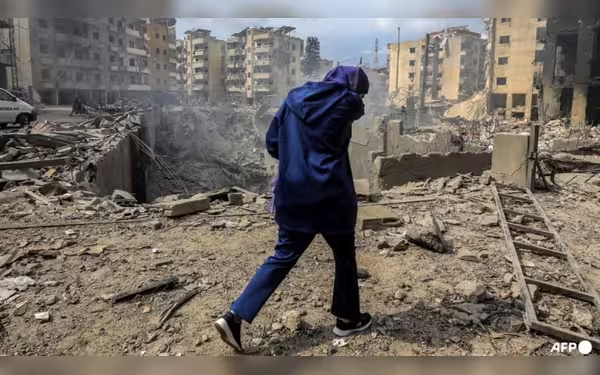Saturday, November 16, 2024 05:49 PM
Lebanon's Displaced Face Suspicion Amid Escalating Conflict
- Tens of thousands flee Israeli airstrikes in Lebanon.
- Displaced individuals met with suspicion by locals.
- Humanitarian crisis worsens as services strain.
 Image Credits: channelnewsasia
Image Credits: channelnewsasiaAs conflict escalates, displaced individuals in Lebanon face suspicion and a worsening humanitarian crisis.
In recent weeks, the ongoing conflict between Israel and Hezbollah has escalated dramatically, leading to a significant humanitarian crisis in Lebanon. As Israeli airstrikes target Hezbollah's stronghold in southern Beirut, tens of thousands of civilians have been forced to flee their homes, seeking refuge in the capital. However, this influx of displaced individuals has not been met with open arms; instead, many Lebanese citizens are viewing these newcomers with suspicion and fear.
Lebanon's complex social fabric, which is divided among various religious sects, has made the situation even more delicate. The Shiite Muslim community, which largely supports Hezbollah, finds itself at the center of this turmoil. Many Lebanese are concerned that the presence of displaced individuals from Hezbollah's stronghold could attract further Israeli attacks, leading to a cycle of fear and mistrust. Christina, a 30-year-old resident of Beirut, shared her experience of taking in displaced families only to feel pressured by her neighbors to ask them to leave. She stated, "Our neighbours found out we were housing people from Dahiyeh and they panicked and started asking questions."
The fear of being targeted is palpable among the residents. Many are haunted by memories of the civil war, which saw families displaced and communities torn apart. As tensions rise, the once welcoming atmosphere in neighborhoods has shifted to one of suspicion. Souheir, a 58-year-old homemaker, expressed her concerns about the displaced Shiite family that moved into her building, noting, "People are looking at each other with suspicion on the streets. They're scared of each other."
As the conflict continues, the humanitarian situation in Lebanon worsens. With over one million people displaced, the capital is struggling to cope with the sudden influx. Services are strained, traffic congestion has worsened, and basic sanitation is becoming a pressing issue. The streets of Beirut, once bustling with life, are now filled with garbage, reflecting the challenges faced by the city in accommodating its new residents.
Outside of Beirut, the situation is no better. In villages like Baadaran, where Israeli strikes have also impacted civilians, residents are becoming increasingly cautious. Emad, a 68-year-old villager, noted that people used to rent out homes freely but are now hesitant, saying, "People used to rent out houses to anyone at first, but now they're being extra-cautious." This sentiment is echoed in Christian villages, where displaced individuals are often left to seek shelter in makeshift accommodations.
The current crisis in Lebanon serves as a stark reminder of the fragility of peace in a region marked by conflict. As communities grapple with the challenges of displacement and the fear of potential violence, it is crucial for the international community to pay attention to the humanitarian needs of those affected. Understanding the complexities of this situation is essential for fostering empathy and support for the displaced, who are simply seeking safety and stability in a time of turmoil.













